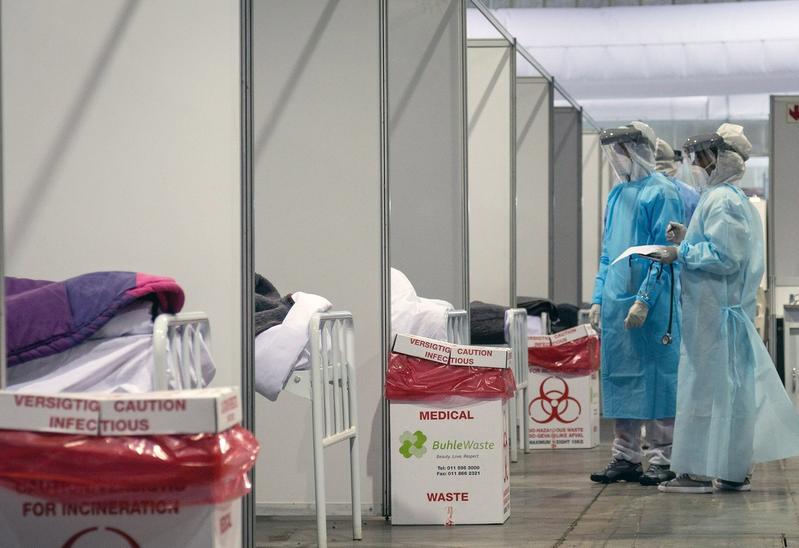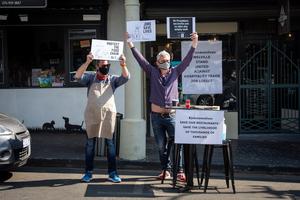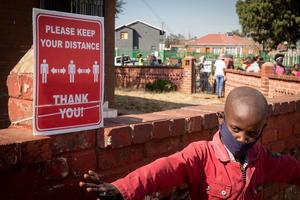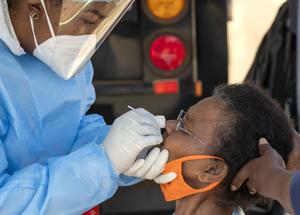Unemployment rises, GDP falls during pandemic
 Doctors inspect a quarantine center in Johannesburg, South Africa, last month. (YESHIEL / XINHUA)
Doctors inspect a quarantine center in Johannesburg, South Africa, last month. (YESHIEL / XINHUA)
Editor's Note: The world faces huge challenges during the global spread of COVID-19, and maybe even greater ones when it is over. Here, in the 18th part of a series titled "One World, One Fight", we look at how countries can work together to fight the virus and meet the challenges when the pandemic ends.
For Dellon Francis, the measures taken to contain the COVID-19 pandemic in South Africa-the country worst-hit by the virus on the continent-have been particularly "disturbing and challenging".
Governments worldwide have enforced lockdowns and social distancing regulations, but Francis, founder and operations director of the investment company Capvest Associates, said: "From a cultural perspective, South Africa is a restless nation. We like to be outdoors and don't like to be constrained.
"The situation is also very challenging for companies in South Africa, as many of them don't have systems in place to support working remotely." He added that cases of domestic violence have risen as a result of employees operating from home.
Containment measures have meant that people have been unable to travel, work from offices or socialize for months. Francis said the restrictions have triggered numerous underlying psychological issues that have affected many people.
As of Sunday, there were 583,653 cases of COVID-19 in South Africa, with 11,677 deaths, according to a number of sources. The country has a population of about 58 million.
The Africa Centres for Disease Control and Prevention said there were 1,108,837 confirmed cases on the continent as of Sunday and the death toll was 25,337.
On March 5, South Africa reported its first COVID-19 case, and enforced a national lockdown later that month to curb the spread of the virus. Borders were closed and most people ordered to stay home, apart from those making essential trips.
 Restaurant employees protest against a lockdown in Johannesburg. (YESHIEL / XINHUA)
Restaurant employees protest against a lockdown in Johannesburg. (YESHIEL / XINHUA)
While there has been a gradual relaxation of the restrictions since May 1, the lockdown measures are reviewed from time to time.
Francis said he has seen many restaurants, shops and real estate agencies close permanently in recent months.
There is still a huge wealth gap in the country, with many people living on less than the equivalent of US$15 a week, he said, adding that the amount of poverty in the country, coupled with unrest, is making the battle against the virus more difficult.
"As the outbreak has resulted in lost jobs and many people currently being unable to earn an income, there has also been a lot of unrest and sporadic protests. That's a really important issue for the government to start tackling," he said.
"Many areas of the country don't have basic services such as clean water, electricity and face masks, or sufficient space to maintain social distancing," Francis said. "Unless the government tackles these grassroots problems, there's no way that it can effectively contain the virus."
Signs of hope
South African President Cyril Ramaphosa said in a recent letter to the nation that he had seen signs of the rapid rise in cases stabilizing. The country's health system, which is under severe strain, is managing to cope, he added.
"The number of new infections has slowed in the provinces of Western Cape, which includes Cape Town, Eastern Cape and Gauteng, which includes the major cities of Johannesburg and Pretoria," Ramaphosa said.
Referring to hard-hit Western Cape, Gauteng and KwaZulu-Natal, he said, "The health system so far has had sufficient capacity to cope with the number of admissions."
He said, however, that in the Eastern Cape several public hospitals were overwhelmed and a specialist team has been deployed to help.
He added that the government acted quickly to deliver adequate supplies of personal protective equipment to areas where there were shortages. It is also working to crack down on corruption during the buying and distribution of medical materials, he said.
Clayton Hazvinei Vhumbunu, technical officer with the Faculty of Humanities at Rhodes University in Eastern Cape province, said COVID-19 will "definitely have far-reaching implications not only on our social life but also in economic terms".
 A boy reminds people to observe social distancing in Johannesburg. (YESHIEL / XINHUA)
A boy reminds people to observe social distancing in Johannesburg. (YESHIEL / XINHUA)
He said people working from home find it hard to form new connections and networks, and have to socialize through online platforms. With restricted working hours enforced at most businesses, shopping and banking have become more difficult.
"I have taken part in several webinars where some participants have been asked to mute their microphones due to background noise or frequent disruptions," he said.
Before the onset of COVID-19, the South African economy was technically in decline.
According to Statistics South Africa, in the third and fourth quarters last year, the country's GDP contracted by 0.6 percent and 1.4 percent respectively.
Statistics South Africa said GDP for the first quarter of this year fell by 2 percent year-on-year, while the Ministry of Finance has said the economy is expected to shrink by 7.2 percent in 2020, the largest contraction for nearly 90 years.
Some 3 million people have lost their jobs nationwide as a result of the lockdown, representing an 18 percent decline in employment, according to findings from the National Income Dynamics Coronavirus Rapid Mobile Survey.
"COVID-19 may be with us for some time. One of our greatest qualities as human beings is the ability to learn, adjust and adapt. This is what COVID-19 requires from all of us," Vhumbunu said.
To survive the pandemic, industries and companies in South Africa have innovated.
With visitors unlikely to return in the short term, virtual tourism has become an important way for destinations and individuals to connect with tourists worldwide.
For example, during the lockdown in Cape Town, virtual tours of the city's leading attractions were launched.
Itineraries include street art walking tours with an artist giving visitors firsthand information, 3-D tours of modern art and interviews with artists, and virtual safaris that include footage of animal sightings and close encounters experienced by rangers on patrol.
Graham Wallington, founder of the South African company Wild-Earth, which takes viewers on virtual safaris through a camera attached to an open-top vehicle, said there had been "a dramatic rise in viewership of our live safaris "and "a fivefold rise in the first two weeks in March."
Early this month, South Africa's Department of Tourism released a draft recovery plan for the sector. The plan envisages tourism in the country being likely between August and May next year, depending on the spread of COVID-19 in different provinces.
Vhumbunu, from Rhodes University, said that the biggest challenge in fighting COVID-19 in South Africa is the reluctance to observe lockdown regulations, especially social distancing.
"Some people are ignorant, while others are taking time to adjust to the reality of wearing masks, avoiding physical contact, and sanitizing. The fact that COVID-19 can be spread by asymptomatic carriers is worsening the situation," he said.
Moreover, there have been challenges in enforcing the 10-day self-isolation period at home for asymptomatic carriers or those suspected to have contracted the disease.
Some people are conducting their business and activities as usual, defying rules, regulations and advice. Others do not have sufficient space at home, especially in densely populated townships and crowded informal settlements, to self-isolate without being in close contact with other family members, Vhumbunu added.
 A South African medical worker collects a nucleic acid sample. (PHOTO PROVIDED TO CHINA DAILY)
A South African medical worker collects a nucleic acid sample. (PHOTO PROVIDED TO CHINA DAILY)
He Yun, an assistant professor at Hunan University's School of Public Administration in Changsha, the provincial capital, said that compared with Europe or China, living conditions in some areas of South Africa mean that pandemic control measures do not work.
"For instance, in slums, conditions are so cramped that social distancing is impossible, while cities such as Cape Town are experiencing chronic water shortages, so people are finding it hard to wash their hands frequently," she said.
As South Africa may lack sufficient resources to fight COVID-19, international cooperation is needed to build up health structures, train personnel, secure food and medical supplies, and offer financial relief, He added.
"Major economies such as China, the United States, the European Union and Japan, and multilateral institutions like the World Health Organization, the International Monetary Fund and the World Bank should all work together to help not just South Africa, but Africa in general fight the devastating consequences of COVID-19, because Africa cannot do this alone," she said.
Tang Xiaoyang, a researcher in African studies at Tsinghua University in Beijing, said the pandemic has weakened South Africa's health systems, ravaged its economy and added to the misery of people living in poverty, which together will have a long-lasting effect on the country.
A considerable amount of global support will be needed to help the nation deal with the pandemic and for its economy to recover, he added.
China vows help
China has provided continuous help to South Africa in the fight against the virus. On April 8, President Xi Jinping talked with Ramaphosa by phone and pledged to provide assistance as requested, share pandemic control experience and strengthen public health cooperation with the African nation.
Medical supplies donated by China arrived at O. R. Tambo International Airport in Johannesburg on April 14.
More donations, including face masks, disposable protective clothing and forehead thermometers from the Chinese authorities and organizations followed.
The Chinese embassy in Pretoria recently handed 20,000 surgical masks and 2,000 medical gloves donated by the China Medical Association of Minorities to the South African government.
Since April, the Chinese government has also invited the country's medical experts to share with South African officials and health workers China's experiences and best practices in fighting the pandemic, including treating coronavirus patients, controlling the spread of the virus in communities and using big data technology to track potential patients.
Agencies contributed to this story.



